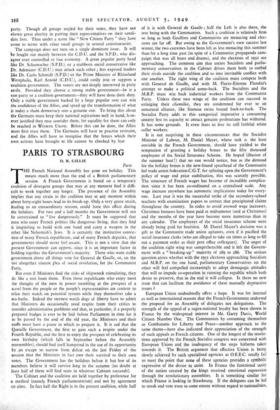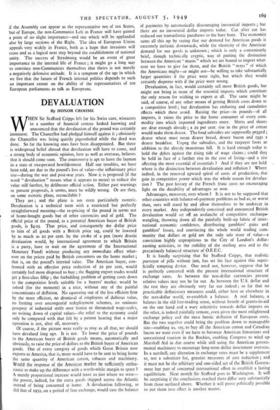PARIS TO STRASBOURG
D. R. GILLIE
Paris THE French National Assembly has gone on holiday. This means much more than the end of a British parliamentary session. A French Government is based on a temporary coalition of divergent groups that may at any moment find it diffi- cult to work together any longer. The presence of the Assembly implies that any strain in the coalition may at any moment within about forty-eight hours lead to its break-up. Only a very grave strain, leading to an extraordinary session, could have this effect during the holidays. For two and a half months the Government will not be constrained to " live dangerously." It must be supposed that men who enter French politics like dangerous living, that they find it inspiriting to build with one hand and carry a weapon in the other like Nehemiah's Jews. It is certainly the instinctive convic- tion of many French republicans, and of many French deputies, that governments should never feel secure. This is not a view that the present Government can oppose, since it is an, important factor in holding together the Government's majority. Those who want stable government above all things vote for General de Gaulle, or, on the not altogether sincere plea of social revolution, for the Communist Party.
But even if Ministers find the risks of shipwreck stimulating, they do like a rest from them. Even those republicans who enjoy most the thought of the men in power trembling at the prospect of a scowl from the people or the people's representatives are content to relax their watch on potential tyrants while they themselves take a sea-bathe. Indeed the sternest watch dogs of liberty have to admit that Ministers do occasionally need respite from their critics to consider administrative problems and that, in particular, if a properly prepared budget is ever to•be laid before Parliament in time for it to be passed by the end of the old year, the Ministers and their staffs must have a pause in which to prepare it. It is sad that the Qucuille Government, the first to gain such a respite under the Fourth Republic, and the first to enjoy the prospect of celebrating its own birthday (which falls in September before the Assembly reassembles), should find itself hampered in the use of its opportunity by .an escape so narrow from defeat on the last Friday of the session that the Ministers in fact owe their survival to their own votes. The Government has the holidays before it but few of its members believe it will survive long in the autumn (no doubt at least half of them will find seats in whatever Cabinet succeeds).
The Cabinet and the coalition are held together by preference for a method (namely French parliamentarism) and not by agreement on aims. In fact half the Right is in the present coalition, while half of it is with General de Gaulle ; half the Left is also there, the rest being with the Communists. Such a coalition is relatively firm so long as both Gaullists and Communists are menacing and elec- tions are far off. But owing to the Government's own success last winter, the two extremes have been felt as less menacing this summer than for a long time past (in spite of a Communist propaganda cam- paign that was all brass and drums), and the elections of 1951 are approaching. The common aim that unites Socialists and parlia- mentary conservatives in the Cabinet drives them both to outbid their rivals outside the coalition and so into inevitable conflict with one another. The right wing of the coalition must compete both with General de Gaulle, and with M. Pierre-Etienne Flandin's attempt to make a political come-back. The Socialists and the M.R.P. must win back industrial workers from the Communist Party. Unless these two wings of the coalition can succeed in enlarging their clientiles, they are condemned for ever to an unnatural alliance, like Siamese twins bound back-to-back. The Socialist Party adds to this categorical imperative a consuming anxiety lest its capacity to attract genuine proletarians has withered. It has some grounds. It even fears to lose its still faithful white collar workers.
It is not surprising in these circumstances that the Socialist Minister of Labour, M. Daniel Mayer, whose task is the least enviable in the French Government, should have yielded to the temptation of granting a holiday bonus to the fifty thousand employees of the Social Insurance Scheme. He hoped (illusion of the summer heat!) that no one would notice, but as the demand for the holiday bonus is the new-found spearhead of the Communist led trade union federation C.G.T. for splitting open the Government's policy of wage and price stabilisation, this was scarcely possible. The structure of French wages has become of incredible complica- tion since it has been co-ordinated on a centralised scale. Any wage increase anywhere has automatic implications today for every- one. Last year it was the successful strike of the secondary-school teachers with examination papers to correct that precipitated claims throughout the country. In order to avoid avowed wage increases, Christmas bonuses have been paid at midsummer (and at Christmas) and the months of the year have become more numerous than in any calendar. The employees of the social insurance scheme were already being paid for fourteen. M. Daniel Mayer's decision was a gift to the Communist trade union agitators, even if it pacified the social insurance clerks (who arc alleged to take six times as long to fill out a payment order as their post office colleagues). The anger of the coalition right wing was comprehensible and it left the Govern- ment with a " breaking-up" majority of 289 to 286. The serious question arises whether with the 1951 elections approaching Socialists and M.R.P. on the one hand, parliamentary Conservatives on the other will feel compelled increasingly to adopt demagogic attitudes that will so impede co-operation in running the republic which both desire to preserve, that in the end it will collapse. Is there no new issue that can facilitate the avoidance of these mutually destructive issues ?
European Union undoubtedly offers a hope. It was for internal as well as international reasons that the French Government endorsed the proposal for an Assembly of delegates not delegations. The strength of the appeal of a supra-national loyalty has been shown in France by the widespread interest in Mr. Garry Davis, World Citizen Number One. The Communists by costuming themselves as Combatants for Liberty and Peace—another approach to the same theme—have also indicated their appreciation of the strength of such appeals to French citizens. One of the longest of the resolu- tions approved by the French Socialist congress was concerned with European Union and the inadequacy of the steps hitherto taken towards it. The British argument that effective Union is being slowly achieved by such specialised agencies as O.E.E.C. totally fail to meet the point that none of these agencies provides a symbolic expression of the desire to unite. In France the functional unity of the nation created by the kings received emotional expression through the revolutionary assemblies. It is something similar for which France is looking in Strasbourg. If the delegates can be led to speak and vote even to some extent without regard to nationalities,
if the Assembly can appear as the representative not of ten States, but of Europe, the non-Communist Left in France will have gained a point of no slight importance—and one which will be applauded also by large sections of the Right. The idea of European Union appeals very widely in France, both as a hope that invasions will cease and as a logical next step beyond the establishment of national unity. The success of Strasbourg would be an event of great importance in the internal life of France ; it might go a long way to convince non-Communists themselves that theirs is not merely a negatively defensive attitude. It is a symptom of the age in which we live that the future of French internal politics depends to such an important extent on the ability of the representatives of ten European parliaments to talk as Europeans.



































 Previous page
Previous page